- Home
- Geoff Wolak
Wilco- Lone Wolf 7
Wilco- Lone Wolf 7 Read online
Wilco:
Lone Wolf
Book 7
Copyright © Geoff Wolak
Started January, 2014
This book is historically very accurate in places, technically correct for the most part, yet it is fiction, really fiction, definitely fiction, and any similarity to real people or real events – although accidental - is probably intentional. Some characters in this book may be based on some of the wankers I have either worked with or unfortunately met over the years.
www.geoffwolak-writing.com
Sand in the kit
The day after we got back from Morocco I was tired, dog tired, and it worried me a little. I had slept for a few hours after arriving back, gotten up and showered, cleaned my kit, and then hit my bed again around 2am, waking at 7am feeling jet-lagged. Despite that, I had headed out for a quick run, feeling a little better after the run, but wondering about my fitness – if not worrying about it.
At 9am we assembled in the briefing room, a few lads not looking as fresh as they should have done, which made me feel better; it wasn’t just me that was tired.
I stood at the front. ‘OK, listen up. Today - all the various bits of kit handed back, checked, cleaned and repaired, personal kit cleaned, and I want all weapons in the armoury cleaned today and tomorrow, or however long it takes, and when you’re done you have time off till next Monday. Today is Tuesday, so if everything is sorted by end of play tomorrow you have some time off.
‘Captain Moran, Swifty, we will – tomorrow morning – go see the Pathfinders and 2 Squadron and have a chat, we departed without saying goodbye. OK everyone, you know what to do, and the faster it’s done the sooner you get some time off.’
‘Any word on Robinson?’ Sasha asked.
I turned to O’Leary, who stood. ‘I was waiting for this meeting, got a call this morning, he ... died in hospital.’ Faces dropped. ‘And Bateman ... he has an infection, might not make it.’ He sat.
‘Any other questions?’ I asked, no energy in my voice.
Crab raised a hand. ‘We get any help in Stores? Sometimes it’s a bit hectic, especially with visitors.’
I turned my head to the Major. ‘Perhaps someone on loan from Brize Norton?’
O’Leary put in, ‘There are two old timers in “E” Squadron, bored at home, they would be keen, and they’re checked out.’
‘Their names?’ Crab asked.
‘Whisky and Toby.’
‘I met them,’ Crab told us. ‘They’re OK.’
I told O’Leary, ‘Bring them in for an interview with the Major first, then we see, but they sound ideal. We met Whisky in Belize.’
‘Whisky is a survival expert on par with Magsee,’ O’Leary began, ‘and Toby is a munitions expert to rival Stretch.’
‘Good skills to have in the group,’ I commended. ‘OK, anything else?’
‘Where’d we sit with the blame game?’ Captain Harris asked from the back.
‘I’ll be talking to London today,’ I told him. ‘Then we’ll have a clearer picture, but I think there are no issues.’
‘And our working relationship with the French?’ a lady captain asked, people glancing at Henri and Jacque.
I held my hands wide. ‘They got their arses kicked, there may be charges brought - their own stupid fault, and they’ve learnt from this. Hopefully. I’ll get an update from London soon.’
‘The newspapers have not been kind to them,’ she nudged.
‘Their own enlisted men ... have not been kind to them,’ I pointed out.
Our admin corporal stepped in. ‘Boss, JIC on its way down.’
‘The shit starts,’ the Major quipped.
‘OK, everyone, be nice around the visitors, but ignore them and get the kit sorted quickly. Dismissed.’
I led the Major back to his office, and I needed a coffee – or two. We tackled paperwork regarding kit for an hour, helicopters announcing the arrival of the JIC mandarins, and I was surprised that the old boys and stuffed suits would risk such a ride. Maybe they needed time out of the office and a quick thrill, I told the Major.
I saluted the UKSF Brigadier in front of the hangar, and welcomed the remainder of the civil servants, bringing them in to the briefing room, tea and coffee made, the Major and Moran in on the meeting, along with Captain Harris.
After the pleasantries were out of the way, the group settled, I gave a step by step summary of what we had done whilst in Morocco, and why, and they took notes – asking questions, an hour used up. The Major detailed what happened to Bateman and Robinson, since he has been stood ten feet away at the time.
They finally asked, ‘And what was said by the French officers upon your return to the airfield?’
‘The original colonel was not there, his replacement was. He kind of apologised for the incident, and told me that Paris was interested in us working together in the future ... and that we should put this behind us.’
‘Working together,’ the chief mandarin began, peering at me over his glasses, ‘means not shooting up civilians and getting a bad newspaper headline.’
‘Perhaps they’ve learnt that lesson,’ I suggested.
‘We can only hope so, and we will make our concerns clear in the future,’ he commented with a falsely civil smile. ‘But are you and your men happy to work with them as before?’
‘I think so, but some of the men may be ... wary, and there is the danger of a wrong comment causing a punch-up.’
‘You still have French soldiers embedded with you?’
‘Yes, and I needed to stop them from killing their officers in Morocco. The French enlisted men side with us.’
‘Well let’s hope they don’t go killing their officers, at least not whilst under your command. We have a request, came in just last week, that their new hostage rescue team come train with you, and be modelled on your team.’
‘New team?’ I puzzled.
‘1st Battalion French Paras will create a unit just like yours,’ a man put in. ‘Aim being to replicate the successes.’
‘Why bother?’ the Major asked. ‘They claim the credit now when we do their damn jobs for them!’
‘Yes, quite,’ the chief mandarin agreed with a supercilious smile. ‘But would you, Captain, have any objections to training such a team?’
‘No, since we’ve already worked with the men in question several times, and probably know the faces. They have some good lads, two of them with me.’
‘We also have a request about the parachute instructors at Brize Norton. Some feel ... that people like your team, and the regular SAS, would ... relate to them in a better way if the instructors saw some action. Problem is ... they’re fitness instructors, not soldiers.’
‘I can get them some training, and then some experience, without high casualties.’
‘Well, we’d prefer no casualties.’
‘Parachuting is a risk, and if they drop into some place like Morocco then there’s a risk, but without facing risk they don’t learn – and get no respect from the soldiers they train.’
‘Then risks should be small.’
‘Then respect will be small,’ I countered with. ‘Can’t have it both ways.’
‘I see.’ Obviously he didn’t, and screwed up his face. ‘Well, we’ll have to give that some thought. There’s also a motion tabled by your good friend the Air Commodore about an advanced survival course for pilots and crew.’
‘That would benefit the crews, since they may end up as four did in Angola – on the ground and taking fire.’
‘That is the example that is cited, yes. But we’d want very low risk for pilots.’
‘Pilots crash their aircraft and helicopters all the time,’ I countered with. ‘With me the risks would not be higher, but
there would be some risk – or again there’s no learning curve.’
‘And this ... learning curve?’ a man pressed.
‘Take the Lone Wolves,’ I began. ‘I trained them here, but I also took them out to the Congo and to Morocco. Here they learnt to fire at paper targets, but on live jobs they felt the fear, the risk, and they matured from it. You cannot teach experience – it has to be felt. Soldiers need to sleep in the jungle under threat to mature, and to be better soldiers next time.
‘I can fabricate that to some degree, and in the past I told men to watch out for mines where there were none, giving them that feeling of risk to help them mature. My men will sit and cook a meal with mortars landing, rounds pinging off the trees, whilst the new lads are scared shitless. You can’t teach that, that comes with experience. Are there peacekeepers still at my old FOB in Sierra Leone?’
‘No, they moved to the capital, and patrol out from there. Things at that FOB were a bit ... basic for them.’
‘Then I suggest we grab that FOB, permanent small team, and rotate aircrews and parachute instructors down there, whilst exaggerating the risks. They patrol out, sleep in the jungle, and get some experience – but with limited risks.’
‘None of our peace-keeping soldiers have been killed in Sierra Leone,’ they noted. ‘A few minor wounds, I believe, so risks are limited, so that may be a good start point yes.’
‘And Morocco?’ I asked.
‘Seems to be a bit ... lively at the moment.’
‘That range we make use of has limited risks. Higher than Sierra Leone, but limited.’
‘Bateman and Robinson would probably disagree,’ the Major curtly put in.
I sighed. ‘We can isolate ourselves better next time,’ I told the group. ‘And it should calm down in time. But with no risk there’s no experience, and experience is what we need to bottle and sell.’
‘Your views now ... on the Lone Wolf programme?’ a man asked.
‘What was obvious ... was that the men who were good at the start were good at the end, they did not swap positions. The good got to be great, the average man got to be good. But ... someone did a good job on selection because their attitudes were very good from the start, and they remain so.
‘What’s needed, in future, is six weeks here, four weeks in some place like Sierra Leone. They can be taught how to shoot, but they need experience, and we need to see how they perform under pressure.’
‘And how did they perform ... under pressure?’
‘Some were nervous but determined, all gelled, and now I’d send them off on a job alone or in teams – having seen them in action. But I would not have said that after their training here; I needed to see them sleeping in the dirt under fire.’
‘Then, in conclusion, the answer to several problems seems to be a foreign FOB with a perceived or manufactured element of risk, living rough, some hardships. And ideally, a high throughput of candidates to get some cost benefits.’
‘If you want good soldiers, then yes - they need such a place,’ I agreed. ‘Patrolling in Northern Ireland helped many a soldier become a good NCO or officer. But it’s not men like the Paras that need the experience, it’s the downed aircrew and the medics, the people that may find themselves behind the lines after a crash.’
‘And new young officers with potential?’ the Brigadier asked.
‘Yes, sir, experience is invaluable. If such an officer was seen to be nervous by his men ... the men would lose confidence.’
‘Advanced planning is underway, a list of candidates put together by the MOD, fifty young officers with potential. We’d like you to give them that experience. And there’s a good budget available.’
‘Straight forwards enough, sir.’
‘You’ll be happy to assist?’
‘I do what I’m ordered to do, sir, but yes – glad to help because it is something I believe in.’
‘And the rooms here?’ he asked.
‘Barracks will hold forty eight, sir, and we have a few houses empty, plus a few brick buildings not in use that could be converted.’
The Brigadier focused on Major Bradley. ‘Give the relevant people a nudge, work out some extra beds.’
‘Will do, sir.’
A man at the back lifted his nose from his notes and asked, ‘What’s your relationship like with the regular SAS these days?’
‘We have them along on most jobs, I make sure of that -’
‘Why ... make sure of that?’ he asked.
‘First, I don’t want us to grow apart. Second, we often need the extra firepower and they have some good lads. Third, I want them to have the experience as much as anyone else.’
‘And Colonel Rawlson..?’
‘He’s done a good job of changing culture, he’s gotten rid of some of the dead wood, and he’s copied many of my programmes, so standards are rising all the time.’
‘He’s modelling the changes on what your team pioneers?’
‘Yes, and simple things like map reading tests get copied for the regulars.’
‘And how did his men behave in Morocco?’ he asked, a cheeky question, the Major stiffening.
‘There were no issues at all, they worked seamlessly with us.’
‘But in the Niger there were some issues?’
‘Yes, a few of his men were a little trigger happy, and have been reprimanded for that. One minor incident, but hard to call.’
‘And the Congo operation went off well?’ he nudged.
‘Yes, no issues apart from one of their lads shooting the other.’
‘But you fell out with Major Chalmers?’ he asked, another cheeky question.
‘He made a formal allegation before fully investigating, something he has since apologised for. There is no bad blood there.’
Half an hour later they departed, waved off.
Back in the Major’s room, the hangar busy with men checking kit, the Major began, ‘Is this place evolving into a damn training centre now?’
‘So what if it does, it all helps the Army. And we’re available for jobs when they come up. If they value us for the training, we’ll lose less men on live jobs.’
He eased back. ‘Does that concern you more these days?’
‘Of course it does. If it was down to Bob and the JIC we’d be out doing jobs every week, and worn down because of it. Regular SAS get one live job a year; we’re getting one a month and losing men. And look at Morocco. We were suited, we helped, but it was hardly our fight.’
‘Definitely not our fight,’ the Major agreed. ‘And two men down because if it, almost a few more. You ... have reservations about the number of jobs given to us?’
‘I love the jobs, more the better, but I worry about the men.’
‘As you should, being a captain an all.’
I shot him a look. ‘I worry about a mortar landing and getting six or eight of them. Then we’d be starting over.’
‘It’s a small team, three foreigners, four including Sasha, so yes – one mortar and half the men gone. But how will the men react to this place becoming a training depot?’
‘As they did with the Wolves – they all wanted to help out. Rocko and Rizzo love teaching, Stretch and Slider, Swifty and Moran. I see no issues. And if we get a bigger budget we train more, more time overseas.’
The hangar was busy all day, and after evening meal I found time to go through my personal kit, a few items cleaned, my clothes in the washer with Swifty’s. I took out every item of my webbing, shook the sand out, and replaced each item after checking it, new batteries grabbed both for my sat phone and my torch.
Swifty and myself were still sorting kit at 10pm, before giving up for the day, a cuppa sat watching the news.
I woke at 6am feeling OK, but not feeling as I used to, but I was determined to get my fitness back, and so knocked out four laps – a few of the younger lads running, and I tackled a few sprints, pushing myself. Tomo joined in, and I beat him when I pushed myself hard. Problem was, I ached afterward
s.
After breakfast, MP Peter drove myself, Moran and Swifty out the gate as it started to rain, and we made good time east through Oxfordshire to Abingdon, having called ahead yesterday. All new recruits for the RAF Regiment now started here, not going through the common RAF training programme at Swinderby as I had done, RAF Catterick now handed back to the Army, the RAF Regiment shrinking rapidly from their Cold War numbers.
Through the gate, we pulled up near the HQ building, inside to find the CO.
‘Ah, Wilco, come,’ he greeted me with, grabbing his hat. ‘We have an intake of new young bloods, you can meet them, inspire them a little.’
‘Do we want more like Wilco?’ Swifty dryly asked, the 2 Squadron officers laughing.
‘One is enough,’ Moran quipped as we walked out.
Around the corner, on an apron in front of a dated hangar, we found them in a squad and marching up and down.
Haines fell into step and joined us with a sergeant from the Externals.
‘Squad ... halt! Left ... turn!’ The corporal saluted his CO as we approached.
‘Stand at ease,’ the Squadron Leader offered.
‘Squad, stand at ... ease!’
They moved legs apart, arms clasped behind backs.
The Squadron Leader began, ‘You have just one short week till your passing out parade, and some of you will stay with us here, most to move on to other squadrons, the start of your careers. And, someday, you may end up with Captain Wilco here, some adventure in a far off land rescuing hostages.’ He stood back, a glance at me.
I moved forwards and took in the keen young faces, most around eighteen years old. ‘About a million years ago ... I went through RAF basic training at Swinderby, then RAF Regiment basic training at Catterick. At 51 Squadron Catterick ... I was bored, and not pushed, so I started running in the mornings, studying in the evenings.
‘Many of the men around me ... sat in the pub of an evening, some watched TV. I ran and I studied, a right unsociable git.’ They smiled. ‘How far you go, how well you do, is down to you – and no one else. You can get fit, study, and end up in the SAS, or end up here in 2 Squadron, working in support of my team.

 K2 book 1
K2 book 1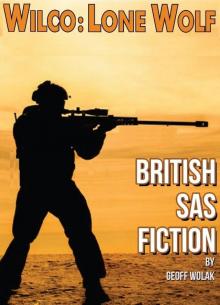 Wilco- Lone Wolf 22
Wilco- Lone Wolf 22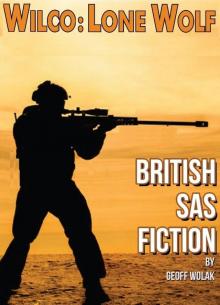 Wilco- Lone Wolf 20
Wilco- Lone Wolf 20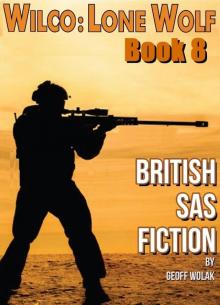 Wilco- Lone Wolf 8
Wilco- Lone Wolf 8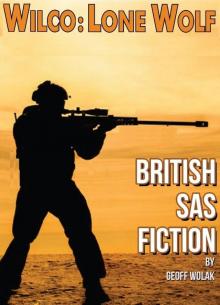 Wilco- Lone Wolf 17
Wilco- Lone Wolf 17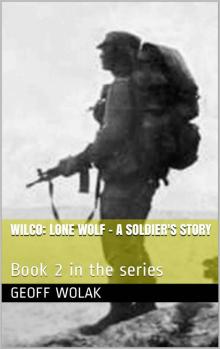 Wilco- Lone Wolf 2
Wilco- Lone Wolf 2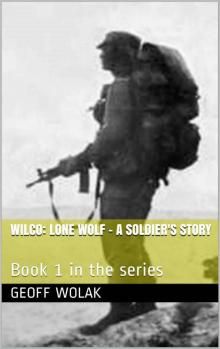 Wilco- Lone Wolf 1
Wilco- Lone Wolf 1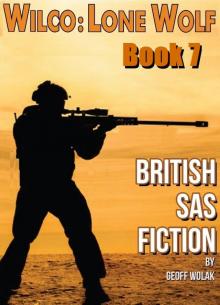 Wilco- Lone Wolf 7
Wilco- Lone Wolf 7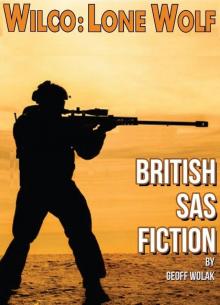 Wilco- Lone Wolf 15
Wilco- Lone Wolf 15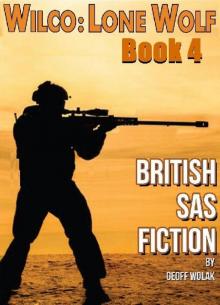 Wilco- Lone Wolf - Book 4
Wilco- Lone Wolf - Book 4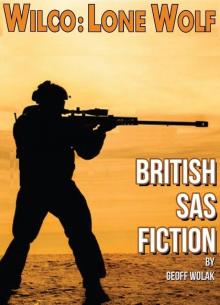 Wilco- Lone Wolf 21
Wilco- Lone Wolf 21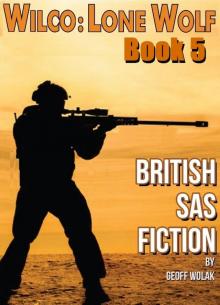 Wilco- Lone Wolf 5
Wilco- Lone Wolf 5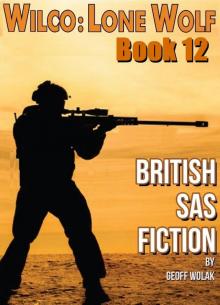 Wilco- Lone Wolf 12
Wilco- Lone Wolf 12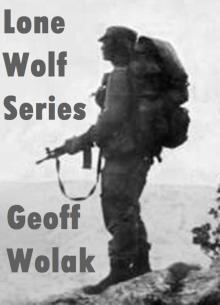 Wilco- Lone Wolf 10
Wilco- Lone Wolf 10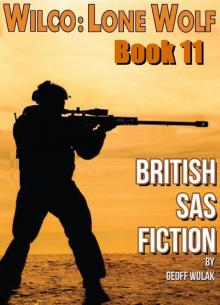 Wilco- Lone Wolf 11
Wilco- Lone Wolf 11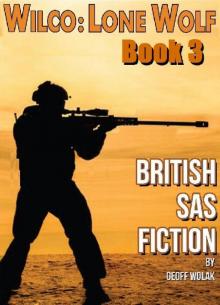 Wilco- Lone Wolf - Book 3
Wilco- Lone Wolf - Book 3 Magestic 3
Magestic 3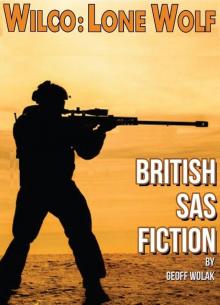 Wilco- Lone Wolf 19
Wilco- Lone Wolf 19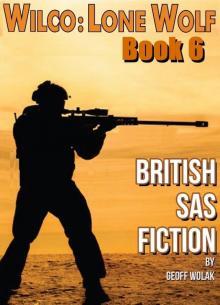 Wilco- Lone Wolf 6
Wilco- Lone Wolf 6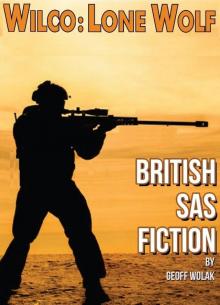 Wilco- Lone Wolf 16
Wilco- Lone Wolf 16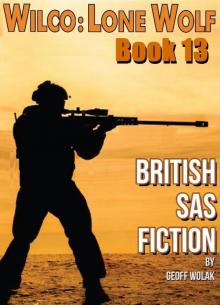 Wilco- Lone Wolf 13
Wilco- Lone Wolf 13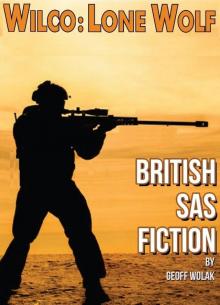 Wilco- Lone Wolf 18
Wilco- Lone Wolf 18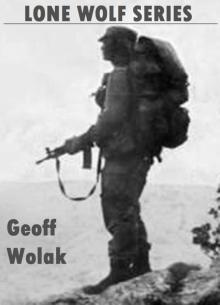 Wilco- Lone Wolf 9
Wilco- Lone Wolf 9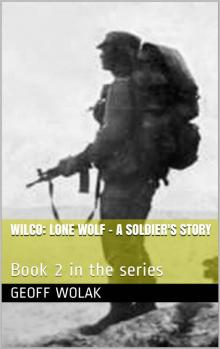 Wilco: Lone Wolf - Book 2: Book 2 in the series (Book 2 of 10)
Wilco: Lone Wolf - Book 2: Book 2 in the series (Book 2 of 10)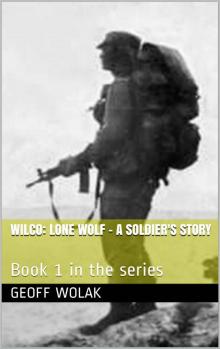 Wilco: Lone Wolf - book 1: Book 1 in the series (Part of an ongoing series)
Wilco: Lone Wolf - book 1: Book 1 in the series (Part of an ongoing series)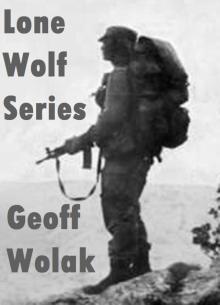 Wilco: Lone Wolf, Book 10: Book 10 in the series
Wilco: Lone Wolf, Book 10: Book 10 in the series